Peking University, December 9, 2020: After the Third “Medicine Humanity and Media (MHM2020): ‘Healthy China’ and Health Communication International Academic Virtual Conference”, one of the sub-forums of Beijing Forum, was held at Peking University on November 7, we had the honor to interview Xu Jing, professor in the School of Journalism and Communication at Peking University. Professor Xu talked about global awareness, critical thinking, problem-solving and self-learning, as well as her suggestions and expectations for students. “You are still freshmen. Take it easy and there will be countless opportunities waiting for you. The more the opportunities you seize, the better you will grow,” Professor Xu told us with a smile on her face.
Communicate to relate
Send an email to the professor, invite to record a video for the meeting, then the professor will leave with the respective reward——This is the general process of asking foreign professors to share their opinions, which is simple and time-saving. However, it is not the case for students majoring in health communication at Peking University. They always have to make full preparations: check the background of professors, read the respective professor’s paper(s) and share it with classmates, and then, email the professor with questions group by group——this actually belongs to the category of the mentor-mentee program to some extent, which also builds a bridge between students and foreign universities. “I think this model embodies communication. The first concept of communication is to relate, which is to reflect and connect, between various people. I hope that through this activity, students and teachers can connect,” said Professor Xu, one of the founders of the health communication major at Peking University.
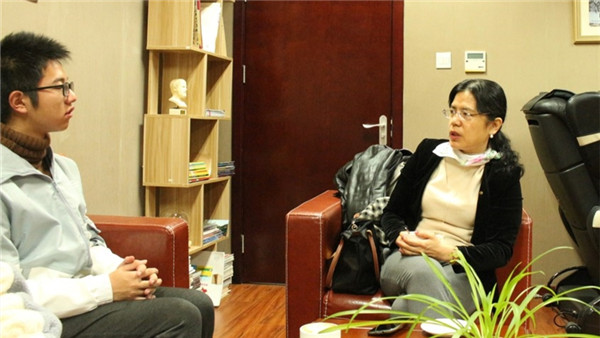
Professor Xu (right) speaks in an interview
“More than that, we also need to connect our teachers with other participants, and connect our major to society through this conference,” she added. Therefore, Professor Xu expects her students to write lecture previews and relevant articles in their column, in order to spread the knowledge they learnt.
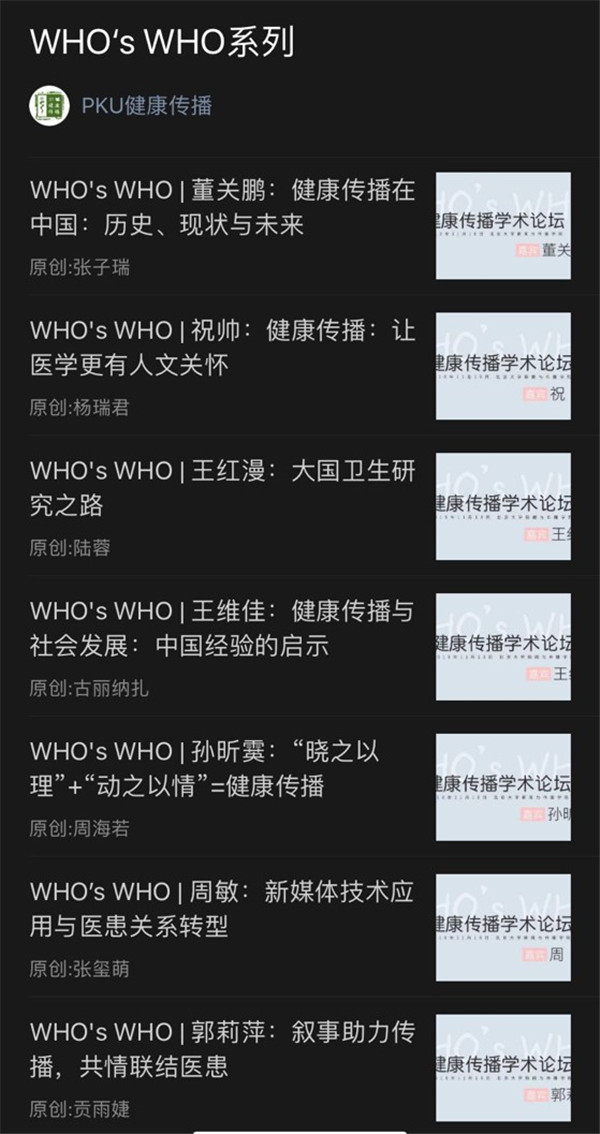
Who’s Who, the column of WeChat Official Accounts: PKU健康传播
Practice to solve problems
“The meeting was attended by students themselves from beginning to end,” Xu said proudly when she accepted this interview. The part of inviting professors mentioned above is only a small part of the preparation for the conference, and in order to exercise the students' problem-solving ability, many projects that could have been outsourced, were all handled by her students. Taking part in this activity really benefits the students a lot, whom not only can receive fees, volunteer certificates, credits, internship certificates and resume enrichment experience, but also deepen the students' awareness of solving problems, and this is exactly what Professor Xu expects. “College is different from high school. A problem is not necessarily just a question in text books, but a problem can also be of real and daily life having no standard answer. The latter needs you to study and explore in person, and requires a high level of problem-solving ability,” Professor Xu said. As the saying goes, “Real knowledge comes from practice.” If you want to prevent your opinion from slipping into a subjective assumption, you must take a down-to-earth approach to improving the ability of solving problems.
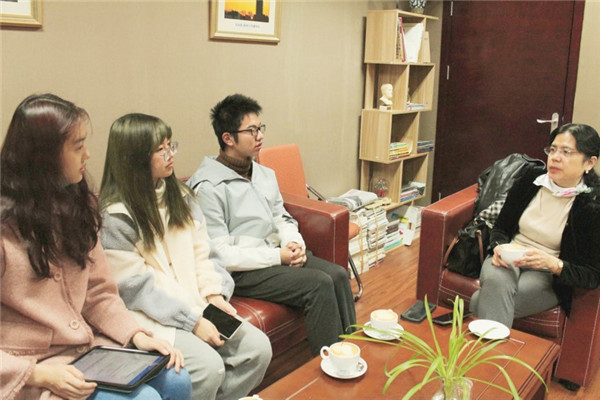
Professor Xu talks with interviewers
If you want to solve problems, you need to ask questions first. Asking questions is an art: Can the question be broken down into a few more minor questions? Can we go from "problem solving" to a "research question"? And most importantly, where is the end of the problem? From a philosophical point of view, Professor Xu called the ultimate goal of the problem an “end of goods”, which comes down to making people better off. Professor Xu cited the little things in her life as an example: she had been unable to cure her nose, but she got relief from her symptoms by running. She put forward a profound insight from this trivial matter: improving the quality of life and curing diseases are of primary and secondary importance, and one shouldn’t go so far as to forget why we set off. “Now many treatments can cure the disease, but other diseases have arisen during the treatment process, and the quality of human life can never be improved. Is this really our original purpose?” Professor Xu asked.
Professor Xu also pointed out that a good question is one that has both depth and breadth. She took the rare diseases group as an example. Patients undoubtedly need attention from the society. However, it is far from enough to just remain at the level of calling for attention, which will not only lack proper pertinence, but also affect the overall fairness of distribution in society to some extent. According to Professor Xu, first of all, we need to figure out whether we should focus on curing the disease or improving their living conditions. For the former one, we pay attention to what the state, the hospital and the pharmaceutical factory should do respectively. For the latter one, should we use relief, public welfare, or government social security? Are they really only able to live by receiving financial aid? Like Heihan Car Wash Center, this is a good example of how society should form organizations that enable people to earn their own living. Any question must be raised in a targeted way so that the right remedy can be found and the precise connection of resources can be achieved.
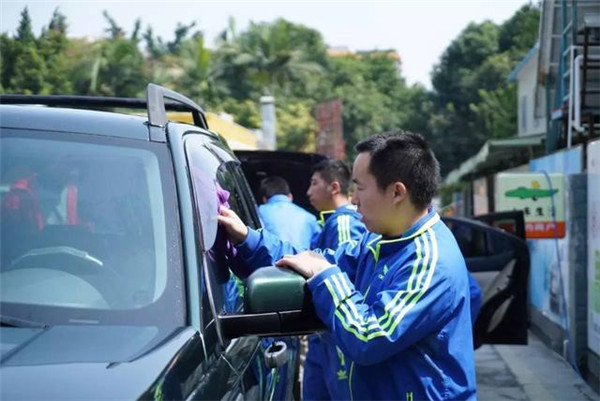
Heihan Car Wash Center gives the disabled chances to earn their own living
Questioning and reflection
Observing, questioning, revising, submitting, selecting and publishing——this is the whole process of producing a paper. But the intention of MHM is to let students understand the complex mechanisms of each step. MHM2020 received nearly 100 submissions, and more than 40 papers were selected after review by experts. Professor Xu hopes that students can always maintain their ability of thinking independently and be brave to question. “Some speeches seem to make sense but you have to think about them carefully and avoid believing completely. Are the questions being asked related to a real problem of the day? Is the research methodology right? Are the statistics correct? Is it dangerous to have a credibility of only 0.7? Only after undergoing all the doubts, can the thesis truly be recognized by society and be produced. In Professor Xu's view, the inclusiveness does not mean absorbing everything completely, but increasing your knowledge and improving your ability to distinguish on the basis of extensive experience.
Doubt is a two-way street. We should not only be vigilant about outside affairs, but also stop constantly to reflect on ourselves. Professor Xu always emphasizes personality training. She believes that many students pay too much attention on learning and gaining knowledge, hence ignoring the importance of seeking themselves. “You have to define yourself. What kind of person am I? What do I like? How can we improve ourselves? Students will get familiar with the environment at Peking University, identify themselves and learn more about what suits them or what they want to do in future eventually. If they focus only on the scores throughout their whole university life, they will end up burning themselves out of ideas. It could be painful,” Professor Xu said.
Therefore, we need to think independently and more. Professor Xu advised students to sort out the harvest of the day before going to bed at night and think about how to improve themselves the next day. “Mankind is the purpose, not the tool, and the purpose of life is the most important. Think about what kind of person I am, and then communicate with my classmates. It is more conductive to growth,” Professor Xu said.
Self-learning ability
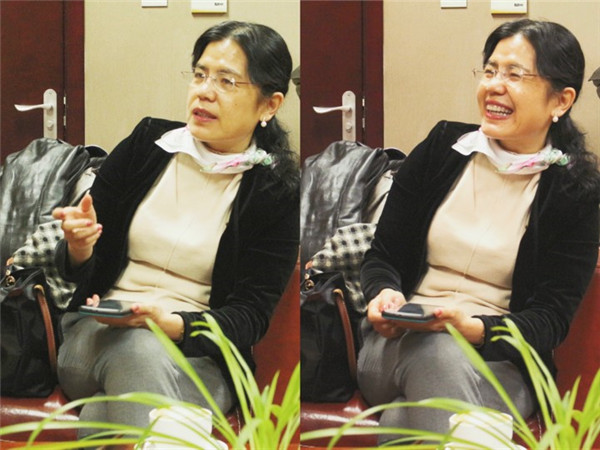
Work like poster design, advertising video production, guest liaison, live broadcasting is all handled by students. As far as Professor Xu is concerned, university is not a cafeteria that students choose the food they want to eat, but instead Li Ziqi’s farm, where you have to grow beans by yourself to cook. In the process of planting, you might meet problems like how to fertilize or get rid of the insects. You need to learn how to meet your immediate needs all by yourself. Therefore, the ability to self-study is very important.
It seems to Professor Xu that the ability to self-study does not simply mean being able to read books and keep up with learning process. It should be on the basis of self-awareness, and we should learn, look for information and take online classes according to our own needs. “Charge the battery in your mind. What you do on your own will always make more sense,” Professor Xu said.
When asked how to take time for self-study, Professor Xu emphasized the importance of making plans and a routine. During her student days in the past, Professor Xu planned her schedule on a table, filled in chunks of time for self-study and set aside some spare time. “I deem it necessary to make a schedule. Some students would say they often don’t know what to do, but when you set your schedules down, you will find everyday fulfilling,” Professor Xu said.
Self-learning sometimes means being more likely to make mistakes. “Our promotional video was not satisfying until the night before the conference. Students didn't know what to show. They were missing the point. What can we do? Another student offered to edit it. It looks much better now, right?” Professor Xu made no secret of the difficulties encountered during the preparation. She encouraged students not to be afraid of making mistakes. “Youth is about making mistakes. Making mistakes more when you’re young means you’ve experienced more, and it’ll all turn into treasure. If you don’t make any mistakes at your age, then you’ve wasted half your youth,” Professor Xu said.
“The purpose of our activities is to provide more opportunities for students to grow up.” Later, students majoring in health communication will also participate in the activity of Chinese Medical Association. They will write biographies and publish books for the advanced medical figures selected, as well as making the story of people remembered by the society. Moreover, there are also science museums and field research, so that students can always focus on problems and are always on the way of practice.
Photo credit to: Wang Mixue